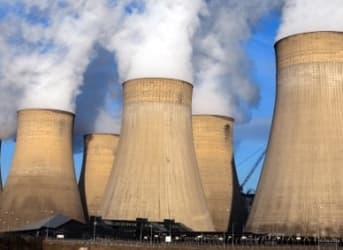The UK laid out a long-term energy strategy ahead of the Paris climate talks that charts a decidedly different future for the country. Energy and Climate Change Secretary Amber Rudd released the vision, which she argues will increase competition and keep a lid on energy prices.
One of the more intriguing aspects of the energy plan is the call to end coal-fired power generation entirely by 2025. While the iconic London smog days are already a thing of the past, the long history of coal burning in Britain may also soon come to an end. Coal still accounts for around 30 percent of electricity generation in the UK, but that could drop to zero. Still, many challenges remain.
“We now have an electricity system where no form of power generation, not even gas-fired power stations, can be built without government intervention. And a legacy of ageing, often unreliable plant(s),” Rudd said at a conference hosted by the Institution of Civil Engineers in London on November 18.
“Perversely, even with the huge growth in renewables, our dependence on coal - the dirtiest fossil fuel – hasn’t been reduced. Indeed a higher proportion of our electricity came from coal in 2014 than in 1999,” she added. “So despite intervention we still haven’t found the right balance.” Related: Why OPEC Can’t Win The Oil Price War
To be sure, the strategy at this stage simply calls for “a consultation” on how to close all coal plants within a decade. Rudd said that only a ramp up in natural gas production will allow for a complete phase out of coal. “But let me be clear, we’ll only proceed if we’re confident that the shift to new gas can be achieved within these timescales.”
In fact, the Rudd plan relies very heavily on natural gas and nuclear power, while eschewing most other forms of energy.
Natural gas production has been a challenge in the UK. Strong opposition from local communities against fracking has blocked drilling from taking place. Cuadrilla Resources became embroiled in a controversial proposal to drill for shale gas earlier this year, a plan that was killed off by local government after sparking outrage within the county of Lancashire. The government of Conservative Prime Minister David Cameron continues to push a pro-fracking agenda, hoping to streamline the permit process, but it is unclear how successful they will be. On the demand side, the Rudd plan hopes to tweak the rules to support the construction of new natural gas-fired power plants. Related: Energy Markets Testing Some Big Investors
Another pillar of the Rudd energy plan is nuclear power. That follows on the heels of a state visit by Chinese President Xi Jingping, which included the state-owned China General Nuclear Power Corporation taking a 33.5 percent stake in the Hinkley Point nuclear power station, a project that is years behind schedule. It may now cost more than 24 billion pounds and won’t come online until 2025. But the UK government wants more nuclear power, and China will help France’s EDF build two more reactors in eastern England. The UK government, which also sees strategic benefits by improving its relation with China, is going ahead with the nuclear plan despite its costs.
In a bizarre move, Cameron’s government is scrapping subsidies for solar and onshore wind, two technologies that have been growing rapidly. Cameron’s government says that financial support for renewables is too expensive, but the renewables industry disputes those claims. In fact, according to the UK’s Solar Trade Association (STA), the financial support for the Hinkley nuclear power station could cost twice as much as similar support for solar. In other words, solar could deliver the same amount of electricity over the same lifetime as the nuclear plant, but at half the price. Several prominent pro-nuclear environmentalists have withdrawn their support from the Hinkley reactor because of the ballooning costs. Related: A “Perfect Opportunity” To Scoop Up Mining Assets On The Cheap Here
The removal of support for solar would cause installations to “fall off a cliff,” according to Jim Watson, the director of the UK Energy Research Centre. Watson says that solar is close to competing with coal and gas on price, but isn’t quite there yet. The solar industry wants supports extended until the end of the decade, after which it can compete without any government help.
The Rudd plan still calls for more offshore wind, but also demands cost reductions before the industry can win contracts.
In short, the Rudd plans appears to be pulling back on renewable energy and throwing all of its eggs in the natural gas and nuclear power basket.
By Nick Cunningham of Oilprice.com
More Top Reads From Oilprice.com:
- Why OPEC Can’t Win The Oil Price War
- Saudis Planning For A War Of Attrition In Europe With Russia’s Oil Industry
- Why French Military Action In Syria Doesn’t Affect Oil Prices



















https://en.wikipedia.org/wiki/EPR_(nuclear_reactor)